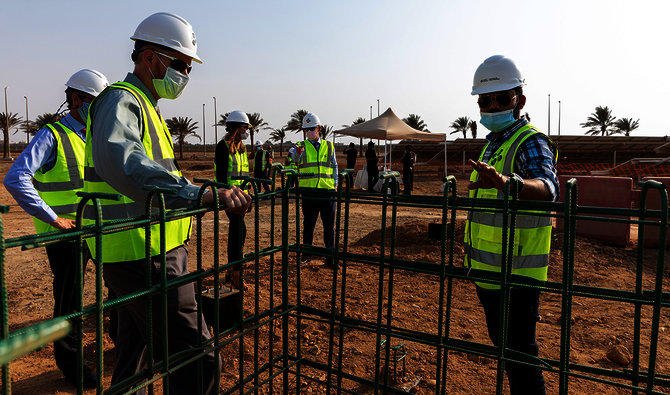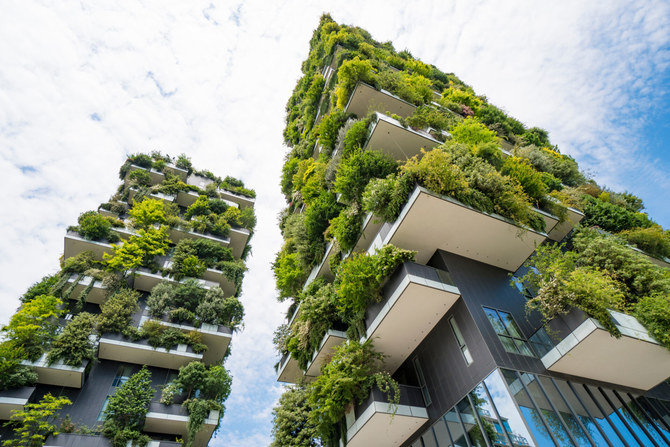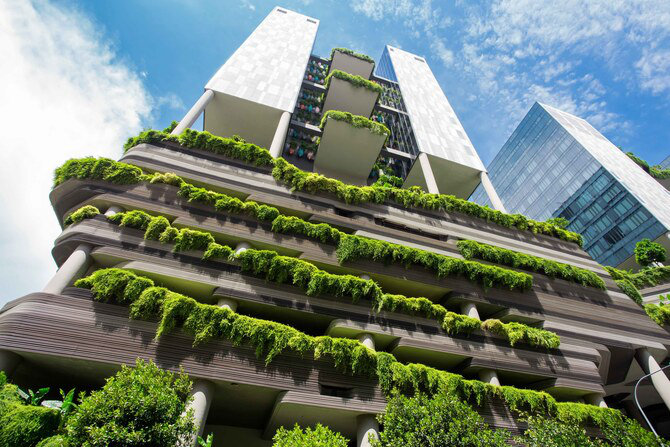RIYADH: Saudi Arabia on Wednesday condemned the storming of the Al-Aqsa Mosque in Jerusalem by a number of Israeli government officials, members of the Knesset, and extremist settlers.
The Ministry of Foreign Affairs also condemned a move by Israeli authorities to allow extremists to organize a provocative march in the city of Jerusalem with the protection of the Israeli defense forces.
Waving flags and many chanting anti-Arab slogans, thousands of Israeli nationalists marched through annexed east Jerusalem’s Old City on Wednesday, with main streets empty of Palestinians fearing attacks.
The so-called Jerusalem Day flag march commemorates the Israeli army’s capture of the city’s eastern sector in the 1967 Arab-Israeli war, home to the Al-Aqsa mosque compound, Islam’s third holiest site, which Jews call the Temple Mount.
The Kingdom affirmed that these violations represented a “provocation to the feelings of Muslims around the world, especially in light of the continuing war and acts of violence against defenseless Palestinian civilians in Gaza and the rest of the occupied Palestinian territories,” the ministry said in a statement.
“The Kingdom also affirms that these systematic attacks are a clear violation of the relevant international resolutions, a violation of the historical and legal status of Jerusalem and its sanctities, and undermine efforts for a just and lasting peace through the establishment of a Palestinian state on the 1967 borders with East Jerusalem as its capital,” the ministry added.
(With AFP)
Saudi Arabia condemns storming of Al-Aqsa Mosque by Israeli officials, and extremist settlers
Saudi Arabia condemns storming of Al-Aqsa Mosque by Israeli officials, and extremist settlers

How Saudi Arabia is making the construction industry greener and more sustainable

- The Kingdom is advancing green construction techniques with cutting-edge technologies, local partnerships, and regulatory support
- Red Sea Global, SCG International, VEKR Environmental Services, and SABIC are setting the standard for sustainable construction
RIYADH: Saudi Arabia is embracing sustainability as a core element of its Vision 2030 economic reform agenda, driving transformative practices across whole industries.
Nowhere is this more evident than in the Kingdom’s construction sector, where innovative solutions and eco-conscious strategies are reshaping the urban landscape.
Through cutting-edge technologies, collaborative efforts and the adoption of environmentally responsible materials, companies like Red Sea Global, SCG International, VEKR Environmental Services and SABIC are setting a high standard for sustainable development.

Red Sea Global has made environmental stewardship a priority across its mega-projects, ensuring that development enhances rather than disrupts the delicate ecosystem.
“At Red Sea Global, we have initiated several critical programs to safeguard endangered species such as the hawksbill turtles and sooty falcons,” Raed Al-Basseet, RSG’s group chief environment and sustainability officer, told Arab News.
“These efforts include habitat conservation, the protection of turtles’ nesting sites, and tagging programs to monitor their behaviors. On birds, we’ve established artificial nesting sites for the sooty falcon and implemented preventive measures to mitigate bird collisions.”

The organization has also embraced advanced technologies to protect marine ecosystems.
“RSG is leveraging state-of-the-art technologies, including drone surveys equipped with multispectral cameras and satellite imagery for coral reef mapping,” Al-Basseet said.
These tools ensure the real-time monitoring of coral reefs, mangroves and seagrasses, while helping respond swiftly to environmental changes.
DID YOUKNOW?
• Saudi Arabia’s construction sector produces about 38% of the Kingdom’s carbon emissions, highlighting the critical need for sustainable practices.
• Mangroves, like those planted by RSG, can sequester up to 10 times more carbon per hectare than tropical rainforests.
• LEED Gold-certified buildings, like SABIC’s Jubail headquarters, consume 30% less energy than traditional buildings.
• 3D-printed construction reduces material waste by up to 60%, significantly lowering environmental impact.
RSG’s achievements extend beyond conservation. The company’s renewable energy initiatives have resulted in the installation of more than 760,500 solar panels, reducing CO2 emissions by 46,350 tonnes annually.
Additionally, its mangrove nursery produced more than 1 million seedlings in 2024, with a target of reaching 3 million this year.
“Our commitment to achieving a net conservation benefit of 30 percent by 2040 is integral to our vision of creating harmonious development,” Al-Basseet added.
Another key player in Saudi Arabia’s sustainability journey is SABIC, a global leader in materials innovation and environmental solutions.

SABIC’s Jubail headquarters, which has been certified with LEED Gold, stands as a symbol of green construction.
The building incorporates solar energy systems, wind turbines and electric vehicle charging stations, while also utilizing water recycling systems and low-energy lighting controls.
Beyond infrastructure, SABIC is pioneering efforts in carbon capture and utilization. The company operates the world’s largest CO2 purification and liquefaction plant, capturing 500,000 tonnes annually to convert into valuable products such as methanol and ammonia.
These initiatives reflect SABIC’s broader goal of achieving carbon neutrality by 2050, with an interim target of reducing greenhouse gas emissions by 20 percent by 2030.
Opinion
This section contains relevant reference points, placed in (Opinion field)
In addition to these efforts, SABIC has launched a circular carbon economy model, promoting renewable energy, chemical recycling and afforestation projects.
The company’s recent exports of low-carbon ammonia to global markets, including Japan and South Korea, highlight its leadership in sustainable industrial practices.
Sustainability in construction is not just about preserving nature but also about adopting technologies that redefine how buildings are constructed. SCG International, a global leader in green building solutions, is paving the way for technological innovation in the Kingdom.
“3D printing technology enables accelerated construction timelines, reducing time by up to 30 to 50 percent and labor requirements by 50 percent,” Abhijit Datta, managing director of SCG International, told Arab News.
“It significantly reduces material waste and ensures no leftover raw materials, contributing to a cleaner and safer working environment, by lowering dust and noise levels.”
Among its innovations, SCG’s concrete fabric offers a sustainable solution for erosion control and water management.
“This flexible material conforms to various shapes, reducing logistics costs and emissions while ensuring durability,” Datta said.

The company’s commitment to local empowerment is equally noteworthy. SCG actively collaborates with Saudi firms to train teams in low-carbon cement and ready-mix consultancy services.
Despite recent progress, the adoption of sustainable construction technologies has faced difficulties.
“One of the primary challenges is the high upfront cost of sustainable building practices, which can be a concern for clients,” Dana Al-Damegh, an environmental consultant at VEKR Environmental Services, told Arab News.
“Many are not fully aware of the long-term benefits, including cost savings and enhanced efficiency, that sustainable materials can offer.”
Another pressing issue is the scarcity of resources.

“There is currently a shortage of locally sourced materials, which poses a challenge to sustainable construction efforts,” Al-Damegh said.
“This scarcity extends to skilled manpower as well, which further impacts the ability to fully leverage local resources. Addressing these gaps is crucial for achieving greater sustainability in the sector.”
Nonetheless, Al-Damegh is optimistic about the future. “The collaboration between environmental services companies and regulatory bodies has been instrumental in driving progress,” she said.
As the Kingdom advances its Vision 2030 reform agenda, the focus on green construction continues to grow. The integration of advanced technologies, development of local supply chains and investments in education as well as training will be critical to scaling sustainable practices.
“The successful implementation of sustainable methods requires collaboration, commitment and the right resources,” said Al-Damegh. “All of which are becoming increasingly accessible in Saudi Arabia’s evolving environmental landscape.”

Saudi Arabia to host multinational ‘Spears of Victory 2025’ military exercise

- Forces from 15 countries will take part, with focus on current and emerging threats
- Tactical operations seek to enhance combat readiness in electronic warfare
RIYADH: The “Spears of Victory 2025” military exercise will begin next week at the Air Warfare Center in Saudi Arabia, the Saudi Press Agency reported.
The exercise will run from Jan. 26 to Feb. 6, and feature participation from 15 countries, underscoring the global commitment to strengthening military collaboration.
Countries contributing forces include Bahrain, Greece, France, Qatar, the UK, US, UAE, and Pakistan. Seven additional nations — Australia, Egypt, Italy, Jordan, Morocco, South Korea, and Spain — will take part as observers, SPA added.
Air Force Maj. Gen. Mohammed bin Ali Al-Omari, the exercise commander, said the aim was to enhance combat readiness, foster the exchange of expertise in planning and execution, and unify the concept of joint military action.
The exercise will focus on addressing current and emerging threats, advancing tactical capabilities, and promoting joint operational strategies, he added.
Participating forces will engage in complex tactical operations designed to simulate threats in an advanced electronic warfare environment, according to SPA.
These operations will integrate branches of Saudi Arabia’s armed forces, the Ministry of the National Guard, and the Presidency of State Security, alongside military contingents from other nations with active forces on the ground.
King Abdulaziz University hosts National Development Fund’s governor at panel discussion

- Stephen Groff looks at achieving aims of Saudi Vision 2030
RIYADH: King Abdulaziz University hosted Stephen Groff, the National Development Fund’s governor, in a panel discussion at the Academic Dialogue Table organized by the Faculty of Economics and Administration.
Groff discussed the role of the NDF and the broader development ecosystem in achieving Saudi Vision 2030, in an event also attended by Dr. Tareef Al-Aama, the university’s president.

Groff said that the fund aimed to enhance developmental impact and improve productivity, highlighting the key strategic priorities and ongoing initiatives being provided to entities under the fund’s umbrella, such as economic diversification and growth stimulation.
He added that the NDF contributed to creating sustainable job opportunities as well as supporting small and medium-sized enterprises and entrepreneurship.
FASTFACT
Groff stressed that one of the fund’s core missions was to develop infrastructure by financing large-scale project.
Groff stressed that one of the fund’s core missions was to develop infrastructure by financing large-scale projects in sectors such as transportation, housing, and public utilities through its affiliated entities, including the recently established National Infrastructure Fund.
He explained that the primary mission of the fund, as a development finance institution, was to empower development funds and banks to achieve their sector-specific objectives, beneficiary goals, and activity targets, while focusing on specific areas and ensuring the financial sustainability of development finance entities in the future.
He concluded by stressing the critical role of the fund in reviewing and evaluating the impact of every program, project, or initiative aimed at addressing developmental needs, economic priorities, challenges, and available opportunities.
GCC secretary general meets Lebanese president

- Albudaiwi wished the president success in his efforts to uplift the Lebanese people and fulfill their aspirations
BEIRUT: Secretary-General of the Gulf Cooperation Council Jasem Albudaiwi met with President of Lebanon Joseph Aoun at the Presidential Palace in Baabda, Beirut on Friday.
Albudaiwi wished the president success in his efforts to uplift the Lebanese people and fulfill their aspirations, the General Secretariat wrote in a report.
He added that the meeting reaffirmed the GCC’s unwavering support for Lebanon, stressing its commitment to bolstering Lebanon’s security and stability and contributing to the sustainable development and prosperity of the Lebanese people.
‘Nusuk’ celebrates big win at 2024 World Summit Awards

- Launched in 2003 and with more than 186 countries participating, the prestigious WSAs are held biennially and recognize impactful digital initiatives
RIYADH: The Saudi Ministry of Hajj and Umrah is the sole Saudi participant to win a 2024 World Summit Award in the Culture and Heritage category, thanks to its “Nusuk” platform.
The project competed against over 900 technical submissions from 160 countries.
Launched in 2003 and with more than 186 countries participating, the prestigious WSAs are held biennially and recognize impactful digital initiatives. They seek to bridge the global digital divide by honoring smart applications and creative online content. The WSAs are a key UN initiative, supported by the International Telecommunication Union.
The award reflects the Kingdom’s pioneering strategy in developing innovative technological solutions aimed at enhancing pilgrims’ experiences and highlighting cultural and heritage values.
FASTFACT
‘Nusuk’ is a suite of innovative technological solutions which facilitate the performance of pilgrimage rituals, address challenges and enhance operational efficiency.
It underlines the Saudi Ministry of Hajj and Umrah’s efforts to drive comprehensive digital transformation, in alignment with the goals of Saudi Vision 2030.
“Nusuk” is a suite of innovative technological solutions which facilitate the performance of pilgrimage rituals, address challenges and enhance operational efficiency.
It has already advanced significantly with the development of pioneering systems such as the Nusuk Card, Nusuk Masar and crowd management systems.
It also focuses on highlighting the Prophet’s biography and cultural landmarks in Makkah and Madinah, featuring more than 150 museums, monuments, restaurants, cafes and tourist destinations, among other notable sites that enrich the user’s experience.
Over 400 licensed guides are affiliated with the platform, offering customized excursions throughout the Kingdom to pilgrims.
The Ministry of Hajj and Umrah has said it is very proud of its achievement and reaffirmed its ongoing commitment to developing technological solutions that ensured the sustainability of the Hajj and Umrah sectors, facilitating easy access to smart services and ensuring a smooth and tranquil performance of the rituals.



















